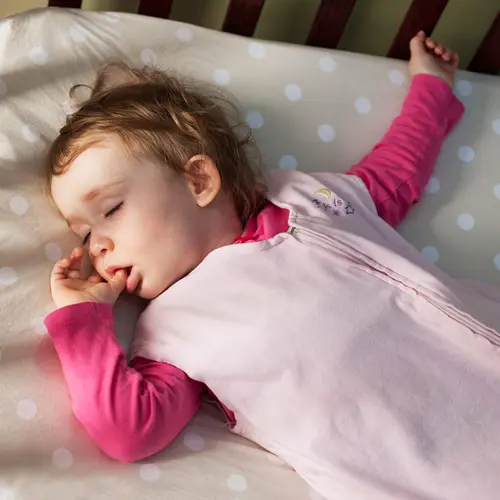"He sleeps in the crib next to the bed, but Meg brings him into bed to nurse him," Sherline explains. He suspects that, as with daughter Mara, the habit will eventually evolve into Little Lee sharing the bed with his parents. "Mara slept with us until she stopped nursing," says Sherline.
Study Discourages Bed-Sharing
But things have changed since two-year-old Mara was the baby of the house. Now the federal government is weighing in on the issue. According to the Consumer Product Safety Commission (CPSC), any child under the age of two should not sleep in an adult bed. The result could be deadly, says a study published by CPSC researchers in the October 1999 issue of the Archives of Pediatric and Adolescent Medicine.
After looking at more than 500 infant deaths that took place over an eight-year period, the researchers concluded that placing children younger than two years to sleep in adult beds exposes them to the following potentially fatal hazards:
- Overlaying by a parent, sibling or other adult sharing the bed
- Entrapment or wedging between the mattress and another object
- Head entrapment in bed railings
- Suffocation on waterbeds
"These deaths are largely preventable," says Suad Nakamura, one of the study's authors.
Discouraging Breast-feeding?
Yet many parents, far from being grateful for being made aware of the dangers of bed-sharing, charge that the practice is cultural and important for establishing the bond between the mother and the child. La Leche League, an international organization that promotes breast-feeding, went so far as to question the study's results and say it discourages breast-feeding.
"That's not what we said at all," Nakamura asserts. The public outcry both surprised and shocked her. "We got all kinds of comments. People were upset because they like to sleep with their infants," she adds.
Nakamura hasn't made recommendations for danger-proofing adult beds. Instead, she maintains that "using a crib that meets all of the government's standards eliminates all hazards."
But Nakamura does point out that the risk of death drops dramatically after the child has reached three months of age. That's when the baby may be strong enough to lift its head or roll over should its mouth or nose becomes blocked. The risk of overlaying, however, still remains.
Despite these warnings, "people are going to make up their minds," says George Cohen, MD, editor of "Guide to Your Child's Sleep: Birth Through Adolescence," to be published in January 2000 by the American Academy of Pediatrics. The book discusses bed-sharing as an option for parents, pointing out its risks and ways to minimize them. "In my personal opinion, bed-sharing is fine if people understand what they are doing," Cohen says.
Sharing a Room
In response to the findings by Nakamura and her colleagues, the SIDS Alliance, a nonprofit organization that supports research and public education on Sudden Infant Death Syndrome, offered a compromise. "It would seem that room sharing, such as keeping baby's bassinet next to the parent's bed ... [is] the best way to maximize all the benefits and minimize all the dangers associated with bed-sharing," says the organization in a written statementreleased the same day as the study.
Though they are well aware of the warnings, McLean and Sherline say they remain unconvinced that they should keep their children out of their bed for safety reasons. "We know that it kind of goes in waves," Sherline says. "During this decade it's acceptable to sleep with your child, the next it's not," he explains.
But Sherline says he and his wife have other reasons for not wanting to share their bed. "We swore it would not happen again," Sherline says, referring to their bed-sharing with daughter Mara. In addition to a loss of privacy, sharing their bed meant less sleep for the couple, he adds.
Getting Mara to sleep in her own bed in her own room took several months, Sherline says. That experience alone may keep Little Lee sleeping safely in his crib until he, like his big sister, is ready for his own bed in his own room and his parents are able to enjoy their privacy, again.

